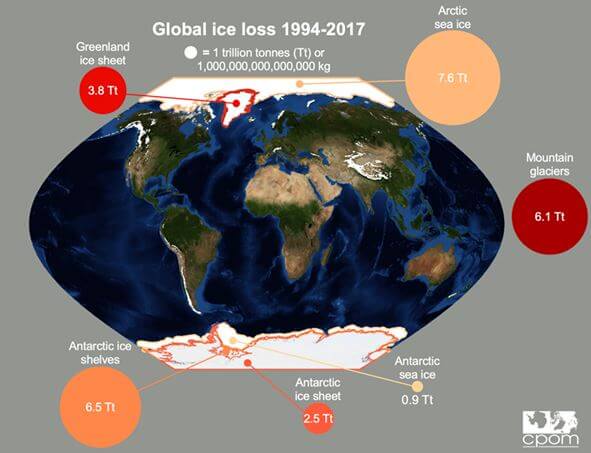According to new research findings from the University of Leeds, melting of glaciers and polar ice sheets is “now following the worst-case climate warming scenarios.” That’s according to satellite data which show that the Earth lost 28 trillion tonnes of ice between 1994 and 2017. The rate of ice loss per year increased by 62.5% from 1994 to 2017.
The study describes itself as the first to use satellite data to collate the total amount of ice that has been lost over the entire planet. Lead author Dr Thomas Slater said, “Although every region we studied lost ice, losses from the Antarctic and Greenland ice sheets have accelerated the most.
“The ice sheets are now following the worst-case climate warming scenarios set out by the Intergovernmental Panel on Climate Change. Sea-level rise on this scale will have very serious impacts on coastal communities this century.”

The Intergovernmental Panel on Climate Change has made clear in the past that sea level rises are complex to predict. However, the last time the earth was 2 – 3 degrees warmer than it is today, the sea level was 6 metres higher, according to the IPCC report.
This is, needless to say, a nightmare situation. It will involve the flooding of major coastal cities and displace upwards of 150 million people, including 36% of the population of Vietnam, 10% of Indonesians and 14% of Bangladeshis.
Moreover, this scenario is most likely irreversible. Carbon dioxide persists in the atmosphere for up to 1,000 years.
It is important, however, to contextualise this data politically. Since 2017, we have seen major advances in commercialisation of zero-carbon energy technologies. This has led the major economies – including the European Union, China, the United States, Japan and South Korea – to commit to ambitious net zero emissions targets by 2050 or, in the case of China, 2060.
A change, it seems, is going to come. This most recent research finding shows just how needed it is.
If you enjoyed this article, you can follow Christian on Twitter.
Feature image courtesy @wolfgang_hasselmann via Unsplash.